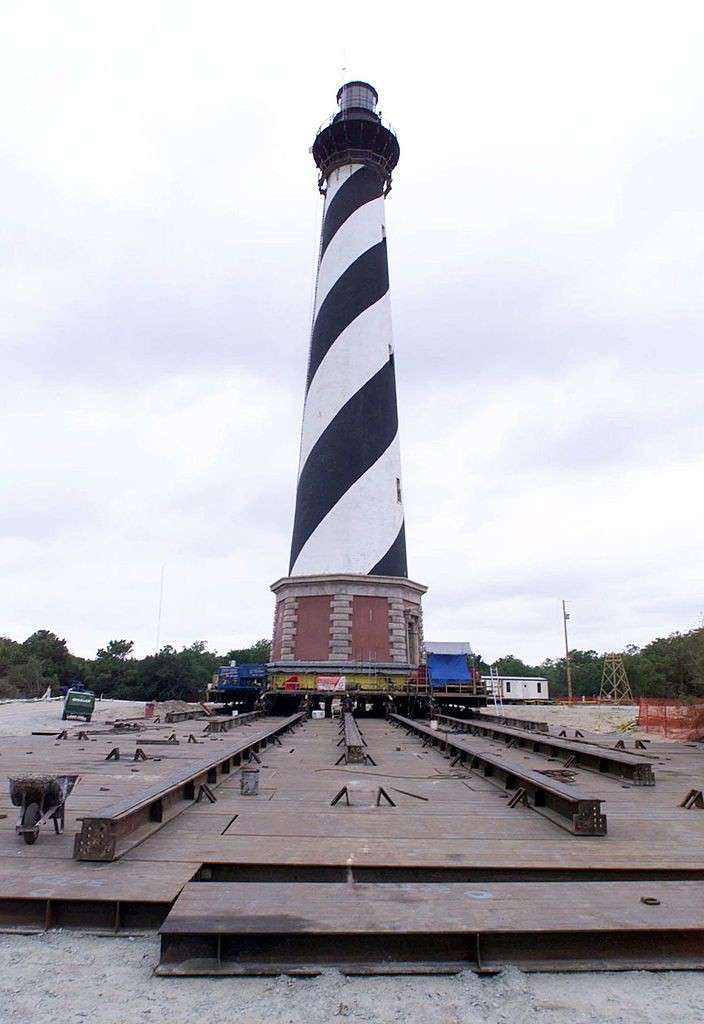Every year, millions of tourists go to the Outer Banks, a series of famed barrier islands that dot North Carolina's coastline, to get away from the daily grind and enjoy the sun and other amenities.
Tourist Spot Eroding

The 152-year-old iconic Cape Hatteras Lighthouse, which stood tall for decades guiding weary seafarers through the Atlantic's dangerously swift-changing sandbars - eerily dubbed "The Graveyard of the Atlantic" - and where now a spiraling red staircase awaits tourists with the stamina to climb to the top, is one of the most popular attractions.
However, natural beach erosion and rising sea levels have reduced the distance between the beacon and the ocean waves to only 60 feet. Local officials and preservationists were obliged to relocate the nation's tallest lighthouse from the beach to its current site, 1,500 feet from the water's edge, in 1999.
It became a contentious multimillion-dollar endeavor. However, a historic lighthouse was salvaged in the end.
Still Struggling
More than two decades later, policymakers and communities are still grappling with the problem of deteriorating shorelines.
"They were always eroding," David Hallac, superintendent of the National Parks of Eastern North Carolina, told AccuWeather National Weather Reporter Kim Leoffler. "It's probably not the best idea to build anything right next to the beach and think you're going to be able to keep it there for hundreds of years."
Experts are certain that rising sea levels have exacerbated and will likely continue to intensify the erosive pressures harming the beaches.
The National Park Service attempted beach replenishment, including the installation of jetties and sandbags to keep the sea at bay, but concluded it needed to take more extreme measures and relocate the lighthouse.
While the lighthouse remains at a safe distance from the coast, for the time being, the state is keeping a careful check on the area's advancing waves.
Changing Sea Level
According to Hallac, the sea level is increasing at 5.3 millimeters per year now.
"That may not seem like much, but it's the equivalent of 1.74 feet in a hundred years," he explained.
Natural pressures such as "increasing water tables," according to Danny Couch, a local commissioner in Dare County, North Carolina, which encompasses most of the Outer Banks villages, continue to influence the resorts.
It's "one of the most active geologic processes out there," she says, "so every little thing that man tries to do has a great impact...so we're trying to be a bit smarter about the future."
Couch can also say that "the storms are getting a little more violent" as a lifetime resident of North Carolina.
Intense Efforts
As part of its efforts to replenish the shoreline, the county has invested roughly $100 million in initiatives. Couch says these "beach nourishment initiatives" pour sand from an offshore source onto the coast.
Officials say that as the shoreline continues to erode and climate change plays a part, several homes are on the verge of collapsing.
He claims that some 15 homes in the village of Rodanthe are in "imminent" danger along a section of Ocean Drive.
Why Are People Still There?
According to Couch, the county has classified 11 of those residences for risks such as deteriorated steps or decks and "an outright loss of the septic system."
Couch understands why people desire to live near water, but local governments and all property owners must respond to environmental issues as they develop.
The Outer Banks' beach weather is frequently in the upper 80s. According to AccuWeather, temperatures reached the low 90s during the summer of last year.
"I completely understand someone wanting to go to a resort and have a home right on the beach," he remarked. "You wake up, take a coffee, enjoy beautiful dawn, and witness a pod of humpback whales passes by. We understand, but you also have to preserve people from themselves, which is a significant duty for any federal, state, or municipal government. That's why, in terms of enforcement, we do what we have to do."
For similar news, don't forget to follow Nature World News!
© 2025 NatureWorldNews.com All rights reserved. Do not reproduce without permission.





